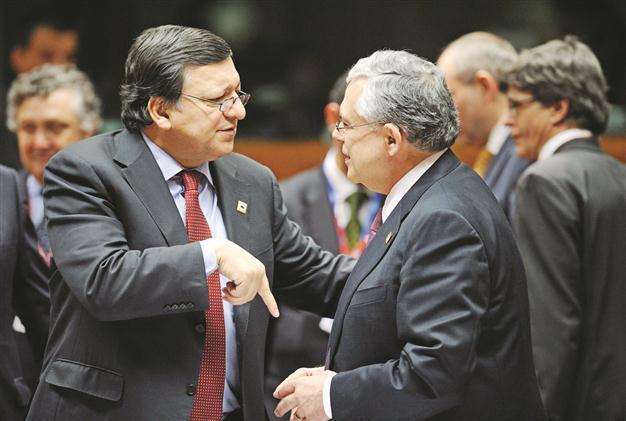EU bids to bury deficit, end Greek debt drama
BRUSSELS - Agence France-Presse

European Commission head Jose Manuel Barroso (L) talks with Greek Prime Minister Lucas Papademos before the start of a session at the EU summit on Jan 30. AFP photo
The
European Union leaders closed one chapter in the debt crisis late on Jan. 30 with a German-driven treaty meant to end deficits -- then launched a race to resolve
Greece’s bailout woes.
EU president Herman Van Rompuy called after for a new deal with Athens “by the end of the week” on the conditions underpinning a long-delayed second bailout for Greece.
Greek Prime Minister Lucas Papademos went immediately into a post-EU summit huddle with a top official from his old employers at the European Central Bank (ECB) and senior EU officials.
“It’s too early now to say we need some extra funding,” Papademos said early yesterday. “Our goal is to avert it.”
In October last year, Greece was promised a second bailout of 130 billion euros if it could convince private investors to write off 100 billion euros of debt.
With Greece facing a big bill for bond redemptions on March 20, EU partners are on edge amid unrelenting fears of default.
Renewed concernsWall Street was gripped with “renewed default concerns towards Greece and Portugal,” investment analysts Charles Schwab said. Eurozone partners’ handling of Greece took a new turn at the weekend when
Germany asked the other governments in the currency area to put Athens under control of EU guardians.
“There cannot be any talk of putting any nation under wardenship,” said French President Nicolas Sarkozy. “It would not be reasonable, democratic and efficient.”
Although Sweden and others showed sympathy, German Chancellor Angela Merkel did not push this plan further on this occasion.
The EU focus on bailouts was supposed to give way at the summit to a renewed push to stimulate growth and create jobs across European economies. This idea even saw tentative moves to place an ambitious free-trade deal with the U.S. on the coming agenda. But at its root was the announcement that 25 of 27 countries had adopted the new pact on budgetary discipline. The Czech Republic joined Britain on the outside looking in, but a threat by Poland to withdraw evaporated after France gave ground in an argument about the influence of non-euro countries on eurozone summits.
Pushed by Germany and the ECB, the treaty -- to be formally signed in March -- will require governments to introduce laws on balanced budgets and impose near automatic sanctions on countries that violate deficit rules.
Only those countries that sign up will be able to access bailout aid from a new rescue fund whose legal basis was also ticked off at the talks. It will enter force after 12 nations ratify it.
